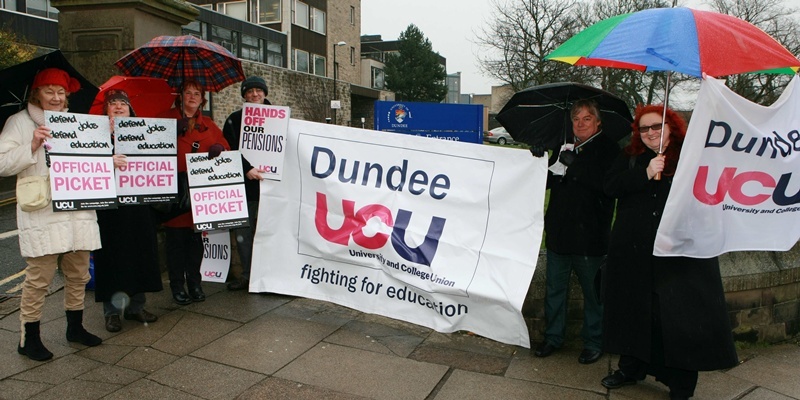Dundee and St Andrews universities are to be hit by industrial action next week.
Academic staff belonging to the University and College Union will be working to contract from Monday in a dispute about pensions.
Seven other Scottish universities will also be affected by what the UCU said would be a ”sustained campaign” at more than 60 higher education institutions across the UK. The union has warned that rolling strikes and a boycott of student assessment could follow if their demands for talks over changes to the Universities Superannuation Scheme are not met.
However, the university employers’ organisation said there had already been ”exhaustive” negotiations.
UCU members will not be working beyond their contracted hours or performing additional voluntary duties. They will not go to any meetings where attendance is voluntary and they will not set or mark any work beyond their contractual obligation.
At this stage the impact on students should be limited, but this may change.
The UCU said: ”The union has chosen its initial action carefully in order to minimise disruption to students. Only where we are faced with USS’s refusal to negotiate or where universities implement unfair pay docking policies will we escalate to action such as strikes which, regrettably, would have a considerable impact on students.”
Up to 100,000 students in Scotland could be affected if the dispute is not resolved.
The UCU has suggested that it would be willing to stop action at any university that publicly calls for negotiations and does not impose salary deductions on lecturers.
Continued…
A spokesman for Dundee University said: ”We are aware of the UCU action.”
The dispute is about changes to the pension scheme that came into force this month. The UCU said scheme members would have to pay more, work longer and have less protection should they lose their job, while lecturers could lose tens of thousands of pounds in pension payments when they retire.
A ballot on industrial action saw more than three-quarters of participants backing the union stance.
Union general secretary Sally Hunt said: ”We are keen to resolve this dispute as quickly as possible with minimal disruption. However, you cannot negotiate with an empty chair. If they had focused just a fraction of the time they have spent trying to force these unpopular changes through on negotiating properly, we would not be in this position.
”We want to negotiate and hope those universities keen to avoid unnecessary confrontation and disruption will start to apply pressure on those refusing to talk.”
A spokesman for the Universities and Colleges Employers Association said: ”Employers are of course extremely disappointed by UCU’s plans to take industrial action. The changes to the scheme were approved by the USS trustee board, which includes UCU representation, on June 9. This followed exhaustive negotiations and consultation.
”The changes would be considered moderate by many as they include the retention of a final salary pension for all existing USS members. Many will be confused by UCU’s position.”
The other Scottish universities to be affected by the work to contract action are Aberdeen, Edinburgh, Glasgow, Heriot-Watt, Stirling, Strathclyde and the Open University. Only UCU members in the ”traditional” universities are members of the Universities Superannuation Scheme.
Those in newer institutions, such as Abertay University in Dundee, and those in further education colleges are members of the Teachers’ Pension Scheme. They are involved in a separate dispute with the UK government over changes to public sector pensions.
